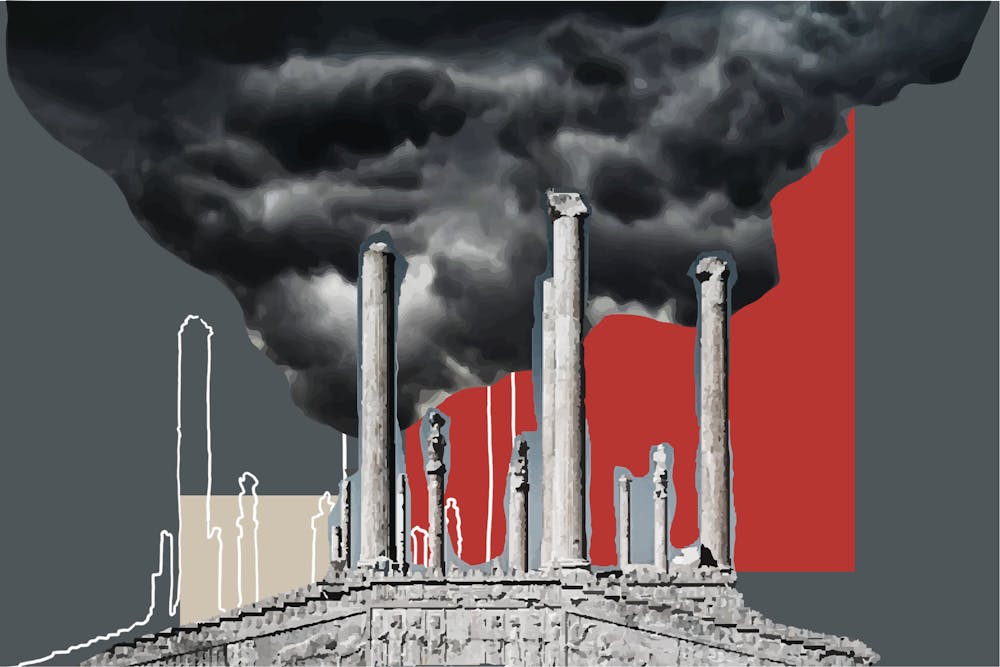Melting glaciers, rising sea levels, and intense heat waves: The list of perils brought on by climate change go on and on, all well–documented by researchers. Global climate change plagues the future of our world, but it also has begun to threaten our record of the past.

The Acropolis is one of the most visited archeological sites in the world, racking up millions of sightseers every single year. It is also one of the best preserved, with an expertly trained task force dedicated to its maintenance. Recently, however, the effects of global climate change have begun to endanger the legacy of this architectural wonder, whose symmetrical appearance, grand columns, and ornate friezes offer us a window into Greece’s history and ancient values.
Acid rain and air pollution continue to erode the monument’s marble columns and foundations, causing the structural integrity of the temples, sanctuaries, and other buildings throughout the Acropolis to weaken. Extreme weather conditions, including droughts and torrential rains, have also increased the amount of erosion, forcing the Greek Culture Ministry to spend money and resources in an effort to protect the country’s history and outpace these devastating environmental catastrophes.

On top of all that, a heatwave in Greece produced wildfires around the country (one of which threateningly approached Olympia), causing the Acropolis to close earlier than expected for a period this past summer. “It’s hard to breathe outdoors ... The sky was grey and red, ash was falling on us. It was apocalyptic,” Eleni Myrivili, the former deputy mayor of Athens, told BBC Radio. “This is an issue of health. We don’t want people exposed to the sun and heat for long periods of time.”
Since tourism represents a significant chunk of Greece's GDP, deteriorating monuments and limited visitation hours could have a significant economic impact on the nation. While partying in Mykonos or fulfilling a Mamma Mia fantasy makes Greece an attractive destination for some, witnessing ancient history still drives the majority of tourism. The prospect of standing on the same hallowed ground as Plato, exploring a theater where citizens may have cried through tragedies, and taking in the history–imbued architecture are fantasies for so many international visitors. We must not allow the climate crisis to take these experiences away.
Sitting atop a limestone hill, the Acropolis has watched over Athens since the construction was completed in the second half of the 5th century B.C. It has housed kings, acted as a mythical home to gods, hosted religious ceremonies, and functioned as a military fortress. It has been invaded, bombarded, and even shaken by earthquakes. Despite these challenges, it still stands centuries later as a compelling historical record of Greek heritage and a visual embodiment of strength and power. But global warming may be the monument’s most determined challenger yet, and the Acropolis isn’t the only archeological site it is putting at risk.
Rising sea levels are heightening flooding risks and shoreline erosion for Jamestown, Virginia, the first English settlement in North America, as well as Easter Island in Polynesia, a UNESCO World Heritage site. The city of Venice is predicted to be flooded for most of the year by the end of the century without rapid intervention. Other monuments have already been lost; the Bronze Age Megalith Temples of Malta are now covered as a result of unnaturally high levels of rain, sun, and pollution. These examples are just a few of the historical sites threatened by the climate crisis.
To save these monuments, we must all be aware of the seriousness of the issue. The laundry list of global warming’s impacts continues to grow longer, and the stakes get higher and higher. While the preservation of historical treasures should certainly not be the primary motivator for action against climate change, it exemplifies the diverse and far reaching impacts of the crisis. The loss of an archaeological wonder like the Acropolis would be devastating for both Greece's tourism industry and cultural heritage, dissolving a link with the ancient past and erasing the foundations of so many aspects of modern society and art. It is vital we all commit to changing the status quo to stop global warming, not just for the sake of the future—but also for the past.







